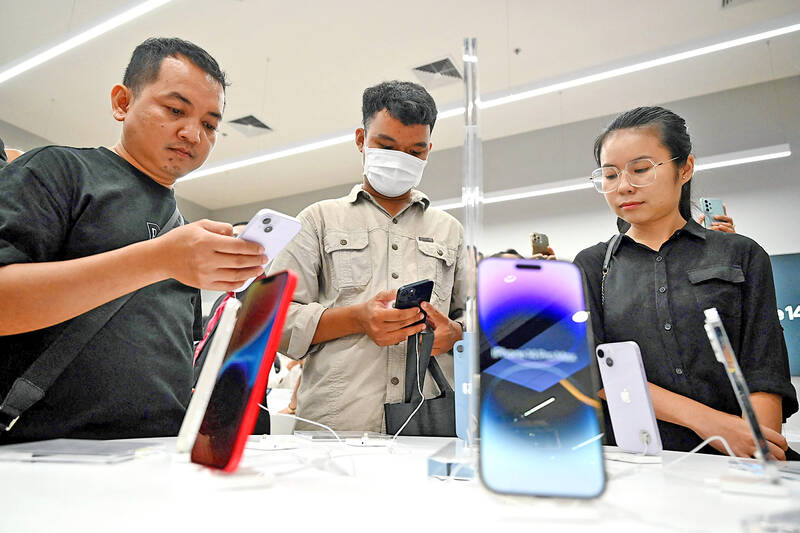Apple yesterday pledged to update software on iPhone 12s in France to settle a row over radiation levels, but concerns in other European countries signaled it might have to take similar action elsewhere.
France this week suspended sales of iPhone 12 handsets after tests which it said found breaches of radiation exposure limits.
Apple contested the findings, saying the iPhone 12 was certified by multiple international bodies as compliant with global standards, but yesterday said it would issue a software update to accommodate the testing methods used in France.

Photo: AFP
Researchers have conducted a vast number of studies over the past two decades to assess the health risks of mobile phones. The WHO said no adverse health effects have been established as being caused by them. However, the radiation warning in France, based on results of tests that differ from those carried out in other countries, has prompted concerns across Europe.
Belgium said it would conduct its own review, while Germany said it was in touch with French authorities to find a EU-wide solution. It was not immediately clear if that might include a software upgrade across the bloc.
Italy is set to ask Apple to upgrade the software on iPhone 12s there, a government source said.
The Dutch Authority for Digital Infrastructure said it was also conducting its own investigation, due in two weeks, and was in contact with Apple, as well as German and French authorities. The agency said it had received calls from concerned consumers.
The French government welcomed Apple’s software update, saying it would be swiftly tested and should allow for sales of the relatively old iPhone 12 model, launched in 2020, to resume.
“We will issue a software update for users in France to accommodate the protocol used by French regulators. We look forward to iPhone 12 continuing to be available in France,” Apple said in a statement.
“This is related to a specific testing protocol used by French regulators and not a safety concern,” it said.
France’s Agence Nationale des Frequences (ANFR) on Tuesday said that the iPhone 12’s specific absorption rate (SAR) — a measure of the rate of radiofrequency energy absorbed by the body from a piece of equipment — was higher than legally allowed, which prompted the sale suspension.
A change in French regulations in 2020 allowed for testing SAR for limbs — holding a phone in hand — as well as for the head and body, used elsewhere. In the French limb SAR tests, which the iPhone 12 failed, it is measured at a distance of 0mm compared with a distance of 5mm for body tests.
Industry experts said there were no safety risks as regulatory limits, based on the risk of burns or heatstroke from the phone’s radiation, were set well below levels where scientists have found evidence of harm.
“Ultimately I suspect the whole incident will be quickly forgotten,” CCS Insight chief analyst Ben Wood said, as the iPhone 12 is an old model.
Apple’s revenue totaled about US$95 billion in Europe last year, making the region its second-biggest behind the Americas. Some estimates say it sold more than 50 million iPhones last year in Europe.

When an apartment comes up for rent in Germany’s big cities, hundreds of prospective tenants often queue down the street to view it, but the acute shortage of affordable housing is getting scant attention ahead of today’s snap general election. “Housing is one of the main problems for people, but nobody talks about it, nobody takes it seriously,” said Andreas Ibel, president of Build Europe, an association representing housing developers. Migration and the sluggish economy top the list of voters’ concerns, but analysts say housing policy fails to break through as returns on investment take time to register, making the

‘SILVER LINING’: Although the news caused TSMC to fall on the local market, an analyst said that as tariffs are not set to go into effect until April, there is still time for negotiations US President Donald Trump on Tuesday said that he would likely impose tariffs on semiconductor, automobile and pharmaceutical imports of about 25 percent, with an announcement coming as soon as April 2 in a move that would represent a dramatic widening of the US leader’s trade war. “I probably will tell you that on April 2, but it’ll be in the neighborhood of 25 percent,” Trump told reporters at his Mar-a-Lago club when asked about his plan for auto tariffs. Asked about similar levies on pharmaceutical drugs and semiconductors, the president said that “it’ll be 25 percent and higher, and it’ll

CHIP BOOM: Revenue for the semiconductor industry is set to reach US$1 trillion by 2032, opening up opportunities for the chip pacakging and testing company, it said ASE Technology Holding Co (日月光投控), the world’s largest provider of outsourced semiconductor assembly and test (OSAT) services, yesterday launched a new advanced manufacturing facility in Penang, Malaysia, aiming to meet growing demand for emerging technologies such as generative artificial intelligence (AI) applications. The US$300 million facility is a critical step in expanding ASE’s global footprint, offering an alternative for customers from the US, Europe, Japan, South Korea and China to assemble and test chips outside of Taiwan amid efforts to diversify supply chains. The plant, the company’s fifth in Malaysia, is part of a strategic expansion plan that would more than triple

Taiwanese artificial intelligence (AI) server makers are expected to make major investments in Texas in May after US President Donald Trump’s first 100 days in office and amid his rising tariff threats, Taiwan Electrical and Electronic Manufacturers’ Association (TEEMA, 台灣電子電機公會) chairman Richard Lee (李詩欽) said yesterday. The association led a delegation of seven AI server manufacturers to Washington, as well as the US states of California, Texas and New Mexico, to discuss land and tax issues, as Taiwanese firms speed up their production plans in the US with many of them seeing Texas as their top option for investment, Lee said. The